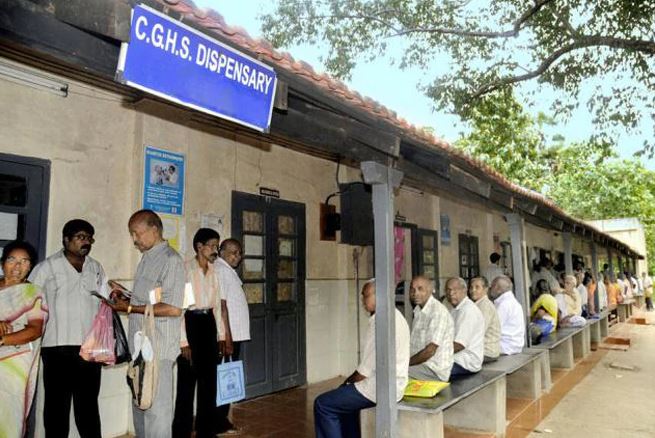Central Government Health Scheme (CGHS) was launched in 1954 by the Government of India. Through this scheme the Central Government employees, pensioners and their dependents are provided with comprehensive medical care facilities.
Unmarried sons of a CGHS beneficiary are also covered under scheme until they attain the age of 25 years. CGHS cover will cease to exist as soon as the son gets married or attains the age of 25.
The Ministry of Health & Family Welfare has now issued a memorandum that allows permanently disabled and unmarried sons of the CGHS beneficiary to be covered under the scheme even after the age of 25 years. However, if the permanently disabled son get married — the CGHS cover will no longer be provided to him.
An office memorandum was issues to this effect on 07 May 2018.
Also the Ministry has expanded its definition of disability. New disabling conditions recognized by the RPWD Act 2016 have been included in the definition. So, for example, now if the son of a CGHS beneficiary has thalassemia — he will be covered under the CGHS. PwD Act 1995, the earlier act that defined disability, did not include thalassemia.

PwD Act had only 7 disability conditions. But the new RPWD Act 2016 has 21 conditions that are recognized as disabilities. See the list of disabilities listed under the RPWD Act 2016.
In the memorandum, the Ministry has outlined what disabilities will be covered by CGHS.
Physical Disability
Locomotor Disability
- Leprosy cured person– suffering from loss of sensation in hands or feet as well as loss of sensation and paresis in the eye and eye-lid but with no manifest deformity or suffering from manifest deformity and paresis or having extreme physical deformity as well as advanced age which prevents him/her from gainful occupation
- Cerebral palsy — caused by damage to one or more specific areas of the brain usually occurring before, during or immediately after birth.
- Dwarfism– a medical genetic condition resulting in an adult height of 147 curs or less;
- Muscular dystrophy– a group of hereditary genetic muscle diseases characterized by progressive skeletal muscle weakness
- Acid attack victims — disfigured due to violent assaults by throwing acid or similar corrosive substance
Visual Impairment
- Blindness – where a person has any of the following conditions after best correction:
- Total absence of sight oi-
- Visual acuity less than 3/60 or less than 10/200 (Snellen) in the better eye with best possible correction
- Limitation of field of vision subtending an angle of less than 10 degree
- Low vision – means any of the following conditions:
- visual acuity not exceeding 6/18 or less than20/60 upto 3/60 upto 10/200 (Snellen) in the better eye with best possible corrections; or
- limitation of the field of vision subtending an angle of less than 40 degree up to 10 degree
Hearing Impairment
- Deaf means persons having 70 db hearing loss in speech frequencies in both ears;
- Hard of hearing means persons having 60 db to 70 db hearing loss in speech frequencies in both ears;
Speech and Language disability
Permanent disability arising out of conditions such as Laryngectomy or aphasia affecting one or more components of speech and language due to organic or neuronal causes.
Intellectual Disability
It is characterized by significant limitation both in intellectual functioning (reasoning, learning, problem solving) and in adaptive behavior, which cover a range of every day, social and practical skills.
- Specific language disabilities — a heterogeneous group of conditions wherein there is deficit in processing language, spoken or written, that may manifest itself as a difficulty to comprehend, speak, read, write, spell, or to do the mathematical calculations and includes conditions such as perceptual disabilities, dyslexia, dysgraphia, dyscalculia, dyspraxia and developmental aphasia
- Autism spectrum disorder — a neuro-developmental disorder typically appearing in the first three years of life that significantly affects a person’s ability to communicate, understand relationships and relate to others, and frequently associated with unusual or stereotypical rituals or behaviour.
Mental Behaviour
Mental illness – a substantial disorder of thinking, mood, perception, orientation or memory that grossly impairs judgement, behaviour, capacity to recognize reality or ability to meet the ordinary demands of life, but does not include retardation.
Mental Retardation
If the persons has mental retardation.
Neurological Conditions and Blood Disorders
- Chronic neurological conditions such as
- Multiple Sclerosis
- Parkinson’s disease
- Blood disorder
Multiple Disabilities
Multiple Disabilities mean more than one of the above disabilities – including deaf-blindness
Bench Mark Disability
Unmarried permanently disabled and financially dependent sons of CGHS beneficiaries suffering 40% or more of one or more disabilities as certified by a Medical Board shall be eligible to avail CGHS facilities even after attaining the age of 25 years.
Use the citation below to add this article to your bibliography
"Use of CGHS Benefits by the Disabled Sons of the Beneficiary." Wecapable.com. Web. March 31, 2025. <https://wecapable.com/cghs-benefits-disabled-sons-beneficiary/>
Wecapable.com, "Use of CGHS Benefits by the Disabled Sons of the Beneficiary." Accessed March 31, 2025. https://wecapable.com/cghs-benefits-disabled-sons-beneficiary/
"Use of CGHS Benefits by the Disabled Sons of the Beneficiary." (n.d.). Wecapable.com. Retrieved March 31, 2025 from https://wecapable.com/cghs-benefits-disabled-sons-beneficiary/

If an adult person was normal and then he met with an accident which made him permanently disabled, can his name be added in the CGHS card??
Permanently disabled married person can eligible for cghs beneficiary..